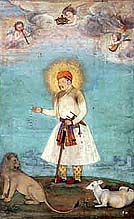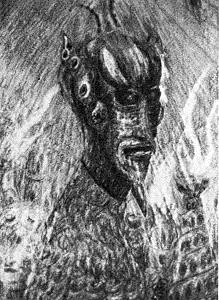
“The Shelter of the World”
I have been a New Yorker subscriber for years, and I love literature. But these two facts have rarely interacted with much felicity. Like a lot of subscribers I know of, and tons more I have my suspicions about, I face your average New Yorker offering of fiction with a sullen, implacable blankness, an anticipation of deep tedium that congeals into an unmoved mover who moves right along into the critical essays. My antipathy is compounded by my deep sense that a lot of this stuff not only represents bad writing (late-stage psychological realism shorn of the lyrical, the wondrous, the philosophically engaged, or the funny) but bad thinking—about the character of fiction, the poetic potential of language, the texture of consciousness, and the opportunities that fiction gives us to model and reflect the magic theatre of that consciousness.
Which is why it was such a great pleasure to read Salman Rushdie’s latest story for the magazine, “The Shelter of the World.” Though I have not been much attracted to Rushdie’s recent novels, he has always appealed to me because, while he remains a definitively contemporary writer, familiar with the texture of dissolving subjectivity and horrified by all manner of fundamentalisms, he retains a rich and playful relationship with the marvelous forms that animate fantasy and folklore. Jihadists may balk, but when it comes to respecting the wizard powers that the phantasm and the dream hold over our waking lives, Rushdie could almost be classed a traditionalist, his gleeful irony a kind of reverence.
“The Shelter of the World” has a setting of high and classy exotica: the court of the great Mughal leader Akbar the Great, and particular his stunning red-brick manse at Fatehpur Sikri, outside of Agra, whose hushed passageways and open plazas remain vividly etched in the lost traveler’s dream that is my memory of India. Akbar , whose great greatness is manifested in part by his perennial use of the royal we, begins, in the midst of his reflections, to wonder at the power of the “I,” and his experiments with the pronoun are hilarious and insightful.
In a handful of pages, Rushdie hits all the buttons: politics, lust, karmic repetition, loneliness, art. The story is funny and wise and confused, but it’s real subject, perhaps the most real subject that remains, is the nature of this self that continues to crave fictions, that finds its voice in fables, that grounds itself in stories even as that ground, and that self, dissolves and flees like grains of sand, as when Rushdie lists all the things Akbar learned as a young man:
About the dignity of the lost, about losing, and how it cleansed the soul to accept defeat, and about letting go, avoiding the trap of holding on too tightly to what you wanted, and about abandonment in general, and in particular fatherlessness, the lessness of fathers, the lessness of the fatherless, and the best defenses of those who are less against those who are more: inwardness, forethought, cunning, humility, and good peripheral vision. The many lessons of lessness. The lessening from which growing could begin.
The story keeps getting better, as various planes of the world are modulated until we are inside a phantasm, Akbar’s favorite wife, Jodha, a living but virtual idea composed of the best aspects of all his harem. In Jodha’s meditations on her own existence, and her dependence on her erotic creator, we not only begin to play with the virtual actuality of fictional characters, but our own dependence on the stories, and story-tellers, that shape our own defining tales. Rushdie unveils the substance beneath fantasy. “What is the whole world became a single waking dream?” Akbar asks his phantom wife. Vain imaginings, we hard-headed residents of the 21st century might say, but she cannot call him a fantasist, because, as Rushdie reminds us, “what else was she?”




